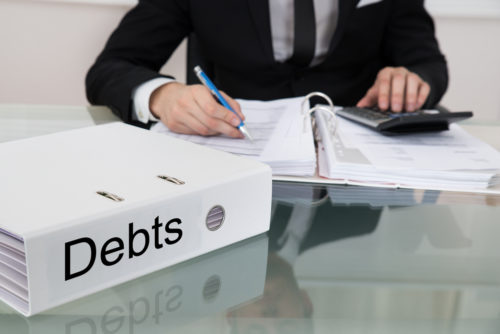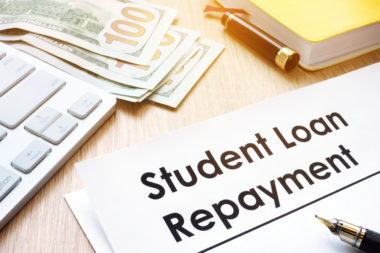Making a plan for paying off student loans can be intimidating, especially if you have multiple sources of debt. Many former students have to deal with both tuition loan payments and credit card debt. How do you start tackling this debt, and which debts should you focus on first? How can you create a realistic plan for making monthly payments?
With multiple sources of debt, you also need to consider the long term consequences of each form of debt and your ability to make timely payments.
Here is what you need to consider when confronted with debt from student loans and credit cards.
Table of Contents
Avoid the Cycle of Debt
Student loan debt and credit card debt are different. Student loans are for education, which may increase your earning potential. You can hypothetically use income that you earn after graduating to pay off your student loans. It is often more complicated than that, but student loans can lead to higher earnings.
Credit card spending does not, in most cases, lead to higher earning potential. So, if you wish to avoid excessive debt, you should focus on not spending with credit cards rather than avoiding student loans. If you can limit credit card spending, you may be able to prevent the cycle of debt altogether.
Many people use credit cards to cover expenses during school, so avoiding credit card usage is not an option.
You do need to make a plan for paying off your debt. Non-payment is not an option. If you do not pay debts, you could experience some serious consequences.
- Your credit score will be ruined, and you will not qualify for loans, mortgages, or credit cards in the future.
- In some cases, lenders could seize your assets or garnish your paychecks to pay for your debts.
- You may get hit with late-payment or non-payment fees.
- You will have to deal with collection agencies, which lenders hire to pressure borrowers who do not pay their loans back.
Deferment and Forbearance
If your debts are overwhelming, you need to be active in pursuing a solution rather than not making payments.
If you are not able to make student loan payments, for example, you can see if you qualify for forbearance. Student loan forbearance allows you to suspend payments on your student loans temporarily. When you take this option, however, interest will continue to accrue. You need to continue to make interest payments or accept that the overall amount of your debt will be higher at the end of the forbearance period.
If you have federal loans, you may qualify for up to 12 months of forbearance if you experience unemployment, medical issues, or other provable financial difficulties. You usually need to provide financial records to prove your eligibility. The forbearance terms for private lenders vary.
Deferment is slightly different than forbearance because you do not have to make interest payments during the deferment period. You can usually only qualify for such a delay if you have a federally subsidized loan. You can be eligible for a deferment if you enroll in school for additional education, have provable economic hardship (such as losing your job), or if you enter the military.
Paying Your Credit Card Off Versus Paying Your Student Loans Off
In general, it is better to focus on paying off credit card debt first rather than student loans. However, everyone’s situation is unique, and you need to weigh different financial variables when creating a debt repayment plan.
Pros of Paying Off Your Credit Card First
- The amount of credit card debt is usually less than the amount of student loan debt. If you can tackle your credit card balances first, then you will only have one source of debt.
- Student loans have more repayment options. You can alter the monthly payment amounts and take advantage of sliding scale payments offered by the PAYE and REPAYE programs. You may also qualify for deferment or forbearance. The credit card company may alter monthly minimum amounts and change the monthly payment due dates, but they offer little help beyond that.
- Student loans have low-interest rates, while credit card interest rates are much higher. Additionally, credit card companies can penalize you by raising interest rates if you miss even a single monthly payment.
- Credit cards affect your credit score more than student loans. For example, a student loan does not count against your credit utilization ratio, which measures the amount of available credit versus current debt amounts. It is one of the primary variables that go into calculating your credit score.
Pros of Paying Off Your Student Loans First
- Student loan payment deadlines are more inflexible. If you are part of a repayment or loan forgiveness program, you need to make your payments on time month after month. Otherwise, you could get disqualified.
- Student loan payments qualify you for tax breaks. Missing payments could hurt you twice because it could mean that you will not be eligible for student loan-related refunds.
- Generally, the amount that you owe for student loans is higher than credit card debt (in most cases). If your loan debt gets out of hand, it could lead to more significant consequences — such as wage garnishment or bankruptcy.
How to Pay Off Your Debt
Whether you are dealing with credit cards or student loan debt, the best way to get out of debt is to make more than the minimum payment each month. Here are some suggestions for doing this:
- One of the first steps that you can take is to prepare for emergencies. One of the biggest roadblocks to debt repayment is having to deal with unexpected expenses. You can build an emergency fund to deal with these expenses so that they do not affect your debt repayment plans.
- You can get extra money for paying off debts by creating a budget and finding ways to cut spending, which allows you to set aside extra money for debt payment. For example, find ways to reduce meal costs by eating at home and looking for cheaper food options at the store, such as generic brands.
- Make realistic repayment plans and monthly payment goals. Choose a sensible amount to pay towards your debt every month. This approach will keep you continually moving towards your goal of full repayment. You can also put extra money toward your debt if it is available.
- Use a strategy to pay off your student loans fast. You can make 13 monthly payments in one year by submitting half of your monthly debt payment every two weeks. This approach will see you making 26 payments per year rather than 24, which equals an extra month of payments towards your debt annually.
If you understand your unique financial situation and create a realistic plan for handling student loans and credit card debt at the same time, you can successfully manage multiple forms of debt.
Image Source: https://depositphotos.com/





